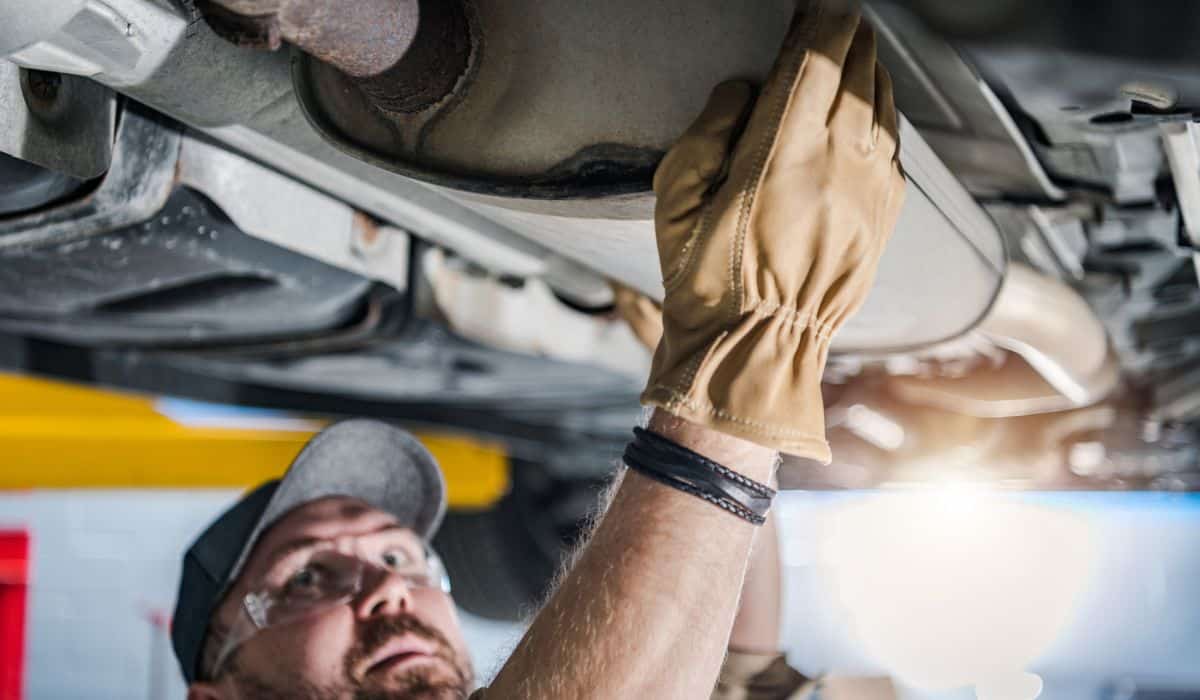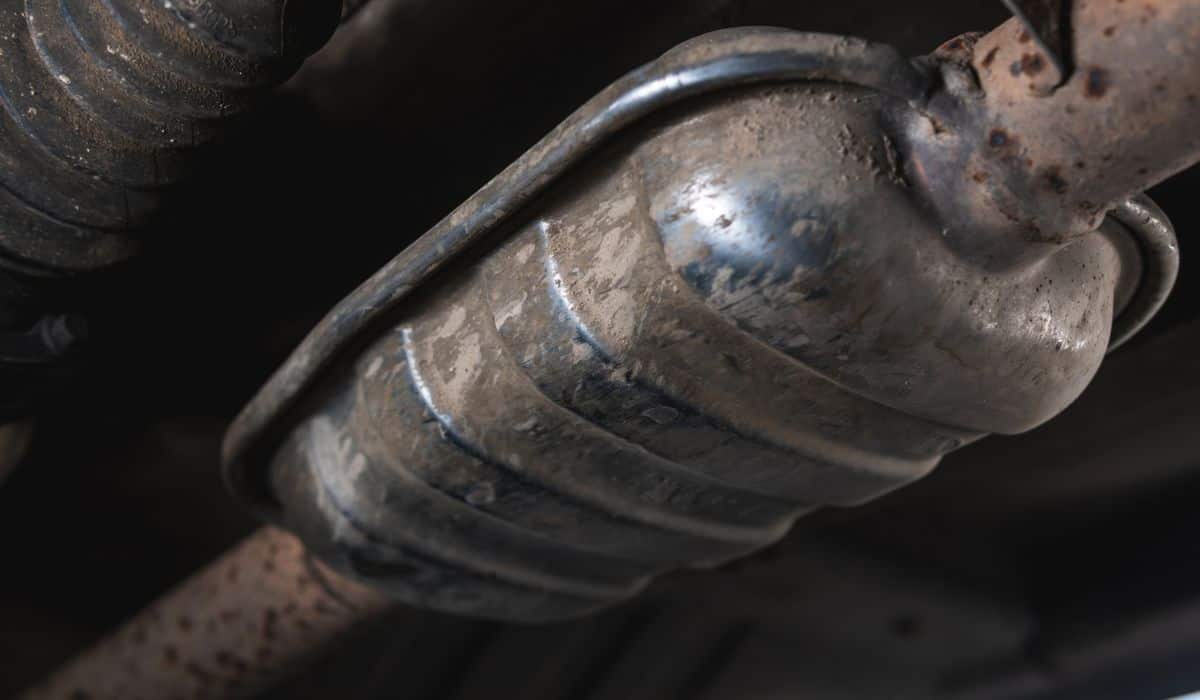Does A Catalytic Converter Reduce The Fuel Smell?
The catalytic converter is a relatively recent addition to combustion engines and is an integral component of the exhaust system. It converts harmful gasses from the engine into less dangerous particles that are safer for humans and the environment. But can it reduce the smell of gasoline coming from a vehicle?
A fully functional catalytic converter reduces exhaust smells into odorless chemicals like steam, carbon dioxide, and nitrogen gas. Failing or broken catalytic converters, however, won’t reduce the smell of gas. Rotten egg-like and sulfurous scents are signs of a faulty catalytic converter.
Don’t panic if you notice an odd smell inside your car’s cabin or coming out of your exhaust pipe. These issues are typically caused by the catalytic converter and are easy to resolve. Let’s take a look at everything you need to know to deal with such a situation.
How Does a Catalytic Converter Reduce the Smell of Fuel?

The catalytic converter is located on the bottom of a vehicle and looks like a large metal box with two pipes coming out of it. It’s an integral component of a car’s exhaust system and reduces harmful emissions — and smells — from entering the air. But how does it achieve this?
When combustion engines burn fuel, they release harmful gasses like CO2, NOx, and CxHx.
The interior catalyst inside a converter includes precious metals like platinum-rhodium and platinum palladium. These chemicals must pass through the honeycomb structure inside the catalytic converter before safely exiting the vehicle.
The two types of catalysts you’ll find include the following:
- Reduction Catalysts: These help decrease nitrogen oxide waste by removing oxygen. Nitrogen oxides are separated into nitrogen and oxygen particles, which are harmless by themselves.
- Oxidation Catalysts: This catalyst is used to convert carbon monoxide into carbon dioxide by adding oxygen.
Essentially, the different metals separate the harmful chemicals into less dangerous nitrogen and oxygen particles. These particles don’t have any odor and are safe by themselves.
Does a Bad Catalytic Converter Cause a Gas Smell?
The catalytic converter is a crucial component for emission reduction and is a legal requirement in many states. But can a faulty converter cause smelly gas? Yes, a failing catalytic converter can contribute to smelly exhaust emissions.
Catalytic converters can become damaged, contaminated, or overheated as they wear out. In these cases, rotten egg-like and sulfurous scents can come from the tailpipe. Some vehicle owners also report these smells in the cabin of the car.
These unfiltered chemicals pose a serious environmental risk, and excessive exposure can harm humans. It’s best to deal with a bad catalytic converter as soon as possible to avoid legal or health complications.
What If You Smell Gasoline?
Faulty catalytic converters typically cause a rotten egg or sulfur smell — but what about a more typical gasoline smell?
Gasoline smells while driving are usually caused by rich air-fuel mixtures, unburned gasoline in the exhaust, or fuel leaks. Your vehicle may be receiving too much fuel or not enough air, and the internal computer isn’t compensating. Fuel leaks are less common in modern cars.
Gasoline in the exhaust can cause vehicle backfires or damage the catalytic converter, so it’s best to resolve the issue as fast as possible.
What Are the Signs of a Bad Catalytic Converter?

Catalytic converters encounter issues all the time. They can suffer from wear and tear or damage over time.
Catalytic converters can also develop clogs just like any other filter on a vehicle. Clogs and blockages typically occur on higher-mileage cars or older models.
There are a few tale-tell signs of a bad catalytic converter to look out for, including the following:
Noticeable Performance Decrease
Decreased performance is one of the first symptoms of a faulty catalytic converter. Your vehicle might feel slow, sluggish, or like it’s struggling more than usual. In some cases, the engine can stop working after a period due to issues with the converter.
Poor Acceleration
Poor acceleration is another common sign of catalytic converter failure. The exhaust gasses in a vehicle must escape and can cause issues if they’re trapped in the car.
Clogged converts can cause the fumes to build up, resulting in poor acceleration. You might also notice jerky driving and stall-outs.
Smoke Coming Out of the Exhaust
If your catalytic converter fails, you may notice dark-colored smoke or smog coming out of the exhaust pipe. Clogs typically cause thick, dark smoke in the catalytic converter or exhaust system.
Sulfur and Rotten Egg Smell
As mentioned earlier, a clogged or broken catalytic converter can result in an unpleasant smell. You might notice a sulfur or rotten egg-like scent coming from the exhaust pipe of your vehicle if the catalytic converter goes bad. These smells can spread to the inside of the car’s cabin in some cases.
Less Fuel Efficiency
Clogged catalytic converters will reduce the amount of airflow in a vehicle’s engine. The engine starts to burn more fuel to overcompensate.
If you notice a significant decrease in fuel efficiency, your catalytic converter may be the culprit.
Problems Starting the Vehicle
Exhaust fumes in a car need to escape. Clogged converters can stop this from happening or cause the process to be less efficient.
This may allow increased exhaust pressure and cause your vehicle to stall when you start it.
Check Engine Light Comes On
The check engine light on a car’s dashboard can indicate many things, including bad converters. The vehicle’s sensors track gas levels via the exhaust to measure the converter’s efficiency.
If the catalytic converter isn’t working correctly, the check engine light may appear.
Don’t avoid getting the check engine light inspected for too long. Your converter might be going bad, or your car may have other issues. Take your vehicle to a licensed mechanic for diagnosis as soon as you can to avoid expensive repairs in the future.
Rattling Sounds
The interior components of a catalytic converter can become loose or break apart due to damage, age, or other factors. The loose and broken parts can rattle around inside the converter while you drive.
You might hear rattling or banging sounds from the underside of the vehicle. These sounds and issues can worsen over time if they aren’t dealt with and it’s best to fix them ASAP.
You Fail Emissions Tests
As mentioned earlier, the catalytic converter is necessary for reducing harmful gasses and passing emissions tests in several states. Failing an emissions test can signal that your catalytic converter is going bad. You might also have some of the other telltale signs mentioned above.
Unfortunately, you won’t be able to drive legally if your state requires a passed emissions test. You’ll need to get your catalytic converter or the issue fixed before you can get back on the road.
